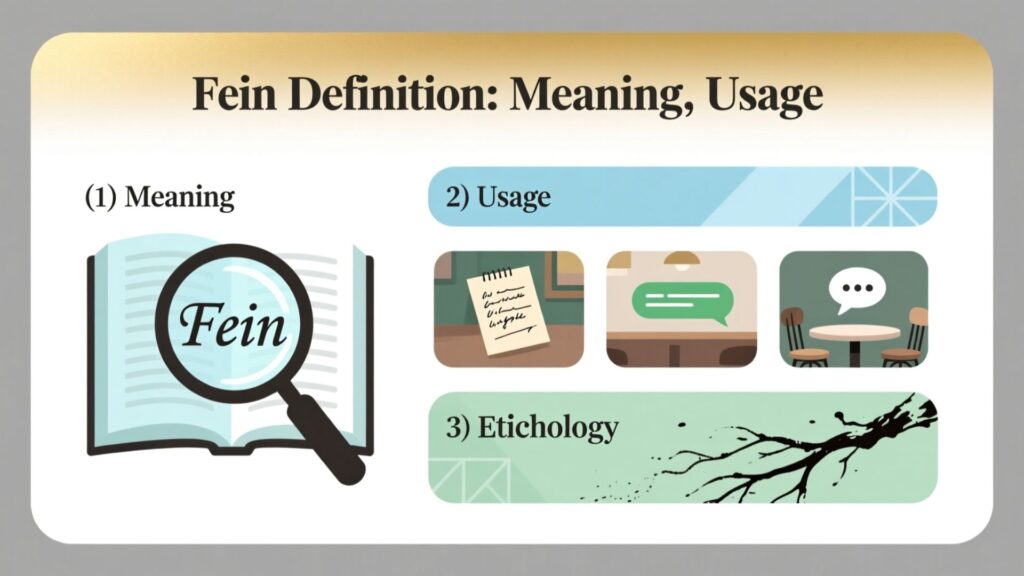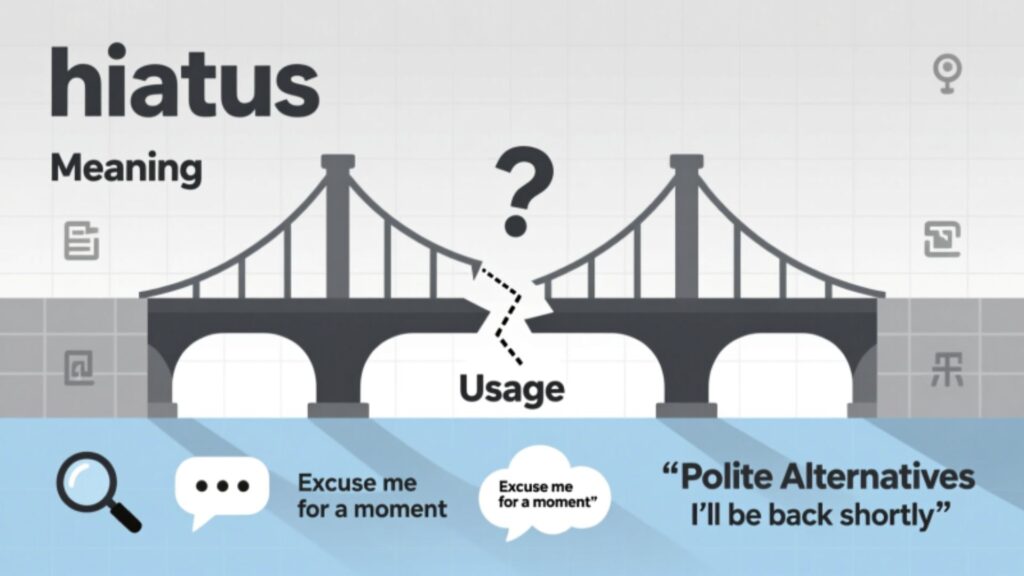Language evolves faster than most people notice. New slang terms pop up, old words gain fresh meaning, and sometimes a single word carries more than one interpretation depending on context. Fein is one of those words. You may have seen it floating around in texts, social media posts, or even casual workplace chats. But what does it actually mean? And how does it compare to the more formal term hiatus?
This guide breaks it all down. We’ll cover the fein definition, its slang usage, its differences from hiatus, and how tone and context shift its meaning. You’ll also find a collection of polite, professional alternatives to hiatus that can make your communication clearer and more thoughtful.
Fein Definition: Core Meaning

The word fein has multiple identities depending on where you encounter it. Let’s look at its primary meanings:
- Slang usage: In slang, fein often describes pretense, exaggeration, or someone faking an action, feeling, or condition. For example: “She’s just fein tired to skip practice.”
- General usage: It can also be shorthand for someone pretending or trying too hard at something.
- Formal usage: Outside slang, FEIN is an acronym for Federal Employer Identification Number, used in the United States for tax and business purposes.
The contrast is sharp. On one side, fein sits in informal, sometimes mocking slang. On the other, FEIN is a highly formal, bureaucratic term. Because of this split, context is everything.
Fein vs. Hiatus: Understanding the Connection
Where does hiatus come into play? The word hiatus means a break, pause, or interruption in continuity. It’s often used in professional or academic contexts, such as:
- “The TV show went on a six-month hiatus.”
- “He’s on hiatus from publishing to focus on family.”
By contrast, slang uses of fein sometimes slip into situations where people mean they’re taking a pause or break but want a less serious or more casual word. This is where confusion happens.
Here’s a comparison table that clears up the overlap:
| Aspect | Fein (Slang) | Hiatus (Formal/General) |
|---|---|---|
| Tone | Informal, playful, sometimes mocking | Neutral, professional |
| Meaning | Pretending, exaggerating, or casually “pausing” | Genuine break, pause, suspension |
| Usage Context | Texts, social media, slang conversations | Business, academia, professional writing |
| Clarity | Often ambiguous | Widely understood |
| Example | “He’s fein working hard, but really chilling.” | “The project is on hiatus until next quarter.” |
As you can see, fein doesn’t exactly mean hiatus but it sometimes sneaks into that role when people want a looser expression.
Fein in Everyday Usage
Slang thrives in places where brevity and relatability matter. That’s why fein shows up most often in text messages, memes, and casual conversations. Let’s break down how people use it:
- As sarcasm: Someone might say “I’m fein studying” while scrolling through TikTok.
- As a casual substitute for a break: “I’m fein out of this group chat for now.”
- To mock effort: “He’s fein like he knows what he’s doing.”
This aligns with fein meaning slang interpretations: it implies faking or exaggerating rather than actually taking a formal pause.
Case Study: Social Media
A college student tweets: “Gonna be fein off socials for a week to focus on exams.”
- Here, fein is used loosely as a substitute for hiatus.
- Followers may understand the intent but also recognize the casual, almost joking tone.
That’s the key fein changes how serious or genuine the break sounds.
Tone, Context, and Word Choice: Why It Matters
Every word choice sends a signal about tone. Using fein instead of hiatus creates a very different impression.
- Professional context: Saying “I’m on hiatus from work duties” sounds intentional and transparent. Saying “I’m fein off for a bit” risks confusion or looking unprofessional.
- Personal context: Friends may find fein lighthearted and playful.
- Public context (social media, blogs): Using fein can feel relatable but might undercut sincerity if the situation is serious.
Think of word choice as the difference between wearing a suit to a business meeting versus sweatpants. Both are clothing, but the signal changes.
Polite & Professional Alternatives to “Hiatus”

Sometimes hiatus feels too formal, and fein feels too casual or unclear. The solution? Use alternatives that strike the right balance. Below are eleven polite and professional options with context for when to use them.
- Taking a breather
- Best for casual updates among peers.
- Example: “I’m taking a breather from volunteering this month.”
- On a temporary pause
- Neutral tone; works for both work and personal life.
- Example: “The newsletter is on a temporary pause.”
- Stepping away for clarity
- Gentle phrasing when you need perspective.
- Example: “I’m stepping away for clarity before making a decision.”
- On hold for the moment
- Suggests an intentional but short-term delay.
- Example: “The project is on hold for the moment.”
- Pressing pause to recharge
- Friendly, approachable tone.
- Example: “I’m pressing pause to recharge before next season.”
- Pausing to reflect
- Works well in personal or professional statements.
- Example: “She’s pausing to reflect on future goals.”
- Taking a reflective break
- Adds intentionality and self-awareness.
- Example: “I’m taking a reflective break from social media.”
- Out for personal reasons
- Direct yet polite.
- Example: “He’s out for personal reasons this semester.”
- Hitting pause intentionally
- Emphasizes choice rather than circumstance.
- Example: “I’m hitting pause intentionally to reset priorities.”
- On a brief intermission
- Light and artistic tone, often used in creative fields.
- Example: “The podcast is on a brief intermission.”
- Taking space to realign
- Signals personal growth and purpose.
- Example: “She’s taking space to realign her work-life balance.”
These alternatives allow you to keep communication polite, professional, and clear without resorting to slang like fein.
When Fein Becomes Problematic
While slang adds flavor to conversations, it can cause issues if used in the wrong setting.
- In workplaces: Using fein may make you look unprofessional or unclear. Colleagues may not know what you mean.
- In serious conversations: If you’re discussing mental health or personal leave, using fein could downplay the seriousness of your message.
- In cross-cultural settings: Non-native speakers or older generations may misunderstand fein, leading to awkward or confusing exchanges.
Essentially, fein can undermine credibility when clarity is most important.
Fein Definition vs. Authentic Breaks: A Practical Comparison
Here’s a side-by-side look at how fein stacks up against authentic expressions of taking a break.
| Expression | Tone | Clarity | Perception |
|---|---|---|---|
| “I’m fein gone for a while.” | Slangy, casual | Low | May sound unserious |
| “I’m on hiatus from posting.” | Neutral, professional | High | Clear and respectful |
| “Taking a reflective break.” | Warm, intentional | High | Seen as thoughtful |
| “Fein out for a bit.” | Informal, vague | Low | Risk of confusion |
This comparison highlights why leaning on authentic, intentional language is better when communication matters.
Embracing Real Language Over Pretending
At its heart, the meaning of fein is about pretending. That’s why its use in place of hiatus doesn’t always land well. Choosing honest, transparent wording builds trust and prevents misunderstandings.
For example, instead of saying:
- “I’m fein leaving the group chat.”
Try:
- “I’m stepping away for clarity.”
- “I’m on a brief intermission from this chat.”
The difference is subtle but powerful. Real language makes people feel respected and informed.
Frequently Asked Questions
What does fein mean in slang?
In slang, fein usually refers to faking, pretending, or exaggerating. For example: “He’s fein working when he’s actually gaming.”
Fein meaning slang vs. fake – are they the same?
Not exactly. While fein definition slang overlaps with the idea of faking, it’s often used more casually or sarcastically than the word fake.
What is the formal meaning of FEIN?
FEIN stands for Federal Employer Identification Number, a unique nine-digit number issued by the IRS to identify businesses for tax purposes.
Should you use fein in professional writing?
No. In professional or academic contexts, fein slang is inappropriate. Stick with hiatus or alternatives like “temporary pause” or “reflective break.”
What does fein mean in the context of a hiatus?
When someone says they’re fein out or fein gone, they’re usually using slang to describe stepping away. However, it doesn’t carry the same clarity or professionalism as saying “on hiatus.”
Conclusion
The word fein has become a versatile slang term with layered meanings. It can describe pretense, exaggeration, or even stand in casually for hiatus. But context is key. In professional or serious situations, fein falls short.
Choosing clear alternatives like temporary pause, reflective break, or on hold for the moment keeps your communication both polite and professional. Meanwhile, in casual settings with friends, tossing around fein may be perfectly fine.
At the end of the day, words shape perception. Whether you’re stepping away from social media, pausing a project, or simply catching your breath, use language that matches your intent. Authenticity beats pretense every time.
Bugti is the founder of Quoethint.com, a hub for English language tips, writing advice, and grammar guidance. With years of experience in English studies and a passion for clear communication, Bugti created this platform to make grammar and writing easy to understand for everyone.
